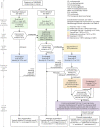International Consensus Recommendations for the Treatment of Pediatric NMDAR Antibody Encephalitis
- PMID: 34301820
- PMCID: PMC8299516
- DOI: 10.1212/NXI.0000000000001052
International Consensus Recommendations for the Treatment of Pediatric NMDAR Antibody Encephalitis
Abstract
Objective: To create an international consensus treatment recommendation for pediatric NMDA receptor antibody encephalitis (NMDARE).
Methods: After selection of a panel of 27 experts with representation from all continents, a 2-step Delphi method was adopted to develop consensus on relevant treatment regimens and statements, along with key definitions in pediatric NMDARE (disease severity, failure to improve, and relapse). Finally, an online face-to-face meeting was held to reach consensus (defined as ≥75% agreement).
Results: Corticosteroids are recommended in all children with NMDARE (pulsed IV preferred), with additional IV immunoglobulin or plasma exchange in severe patients. Prolonged first-line immunotherapy can be offered for up to 3-12 months (oral corticosteroids or monthly IV corticosteroids/immunoglobulin), dependent on disease severity. Second-line treatments are recommended for cases refractory to first-line therapies (rituximab preferred over cyclophosphamide) and should be considered about 2 weeks after first-line initiation. Further immunotherapies for refractory disease 1-3 months after second-line initiation include another second-line treatment (such as cyclophosphamide) and escalation to tocilizumab. Maintenance immune suppression beyond 6 months (such as rituximab redosing or mycophenolate mofetil) is generally not required, except for patients with a more severe course or prolonged impairments and hospitalization. For patients with relapsing disease, second-line and prolonged maintenance therapy should be considered. The treatment of NMDARE following herpes simplex encephalitis should be similar to idiopathic NMDARE. Broad guidance is provided for the total treatment duration (first line, second line, and maintenance), which is dictated by the severity and clinical course (i.e., median 3, 9 and 18 months in the best, average, and worst responders, respectively). Recommendations on the timing of oncologic searches are provided.
Conclusion: These international consensus recommendations for the management of pediatric NMDARE aim to standardize the treatment and provide practical guidance for clinicians, rather than absolute rules. A similar recommendation could be applicable to adult patients.
Copyright © 2021 The Author(s). Published by Wolters Kluwer Health, Inc. on behalf of the American Academy of Neurology.

